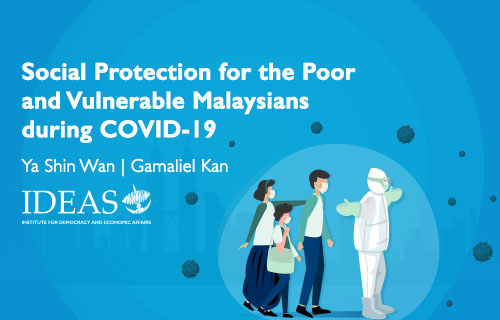IDEAS calls for greater social protection for vulnerable Malaysians

- COVID-19 has exacerbated the existing vulnerabilities of the poor and economically vulnerable and new vulnerabilities that were not prevalent before COVID-19 have emerged.
- Most of the announced measures are short-term measures designed to ‘cope’ and target groups that are vulnerable to the loss of livelihoods. However, other vulnerable groups such as informal workers, non-COVID-19 patients, school children and women, are insufficiently protected by COVID-19 social protection programmes during this pandemic.
- As Malaysia shifts towards recovery and rebuilding resiliency, social protection should be increasingly focused on helping the people adapt to the changes and mitigate future risks.
- IDEAS calls for the prioritisation of a comprehensive social protection system that has the capacity to extend social protection coverage to those who are not protected and vulnerable.
Kuala Lumpur, 8 Disember 2020 – The Institute for Democracy and Economic Affairs (IDEAS) today published a policy paper titled “Social Protection for the Poor and Vulnerable Malaysians during COVID-19”. The paper was authored by IDEAS’ Research Manager of Social Policy, Wan Ya Shin and Research Executive, Gamaliel Kan.
This paper examines how social protection has responded to the needs of the vulnerable during the COVID-19 pandemic in Malaysia. It finds that while most of the COVID-19 social protection programmes have a high disbursement rate, there are segments of society who are not adequately protected. These include the informal workers, non-COVID-19 patients, school children and women. In addition, the measures implemented during the COVID-19 pandemic have been focused on protecting livelihoods, public health and addressing food insecurities whilst other vulnerabilities stemming from issues such as the digital divide, mental health and gender disparities, have not been sufficiently addressed.
The COVID-19 pandemic has highlighted gaps in our predominantly employment-based, social protection system. Moving forward, Malaysia must prioritise the building of a comprehensive social protection system that is capable of providing adequate protection for all vulnerable groups during normal times and times of crisis. These vulnerable groups include the informal workers, people living in rural areas and other non-working groups, such as children, the elderly, housewives and people with disabilities. Ensuring adequate social protection is in place is an essential component of a sustainable economic recovery that will make Malaysia more resilient to future shocks. Social protection programmes that mitigate future risks and help the workforce to adapt to the world post-COVID-19 must therefore be prioritised.
The key recommendations based on the findings of the research are:
- Integrate and coordinate all social protection programmes into a system rather than viewing it as fragments of programmes;
- Establish an integrated social protection database for efficiency, effectiveness, and coordination
- Improve social assistance programmes’ coverage and adequacy to ensure that other vulnerable non-working groups are sufficiently protected.
- Investigate the factors that lead to the low take-up rate of EPF’s i-Saraan Scheme and SOCSO’s Self-Employment Social Security Scheme by informal workers and create appropriate incentives for them to contribute voluntarily to these schemes.
- Expand internet connectivity to cover both urban and rural areas to ensure digital inclusivity.
- Increase access to financial services to those who are excluded from traditional banking, such as deploying mobile bank services in inaccessible rural areas.
Commenting on the release, Wan expressed that “The Covid-19 pandemic has shed light on the gaps in our social protection system, which was established in the 1950s. As urbanisation and globalisation takes place, there needs to be a paradigm shift with the role of social protection in society. It is time to have a conversation on the form and function of Malaysia’s social protection system in our society.”
IDEAS CEO, Tricia Yeoh commented, “I urge the Malaysian government to consider the recommendations this paper puts forward. While our social protection system may have served Malaysians well in the past, there is a need to streamline and integrate the currently fragmented programmes, to ultimately ensure those in the most vulnerable groups will obtain the assistance they need especially in the wake of Covid-19.”
A copy of Policy IDEAS No. 69 can be downloaded here
— END —
For media enquiry, please contact Wan Ya Shin at yashin@ideas.org.my.

